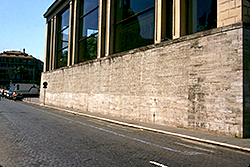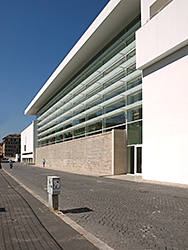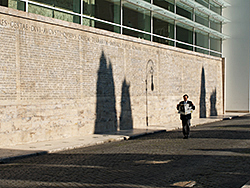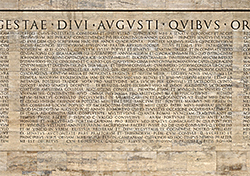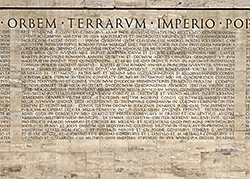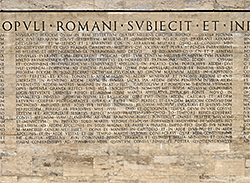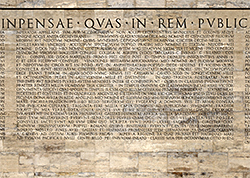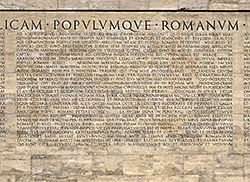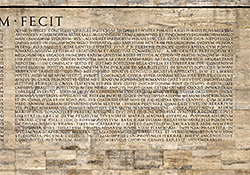Museo dell'Ara Pacis - Exterior
Res Gestae
In addition to the Ara Pacis itself, this wall is the only survival from the 1938 pavilion that was incorporated in the new 2006 museum. In 1938-1939 the Res gestae Divi Augusti ("Deeds of the Divine Augustus") was engraved on the travertine east wall of the new pavilion constructed to house the Ara Pacis, and bronze letters inserted.
The architect of the pavilion, Vittorio Ballio Morpurgo, designed the layout of the inscription on 7 panels. Like the Ara Pacis itself, this wall survived the destructions of Word War II in place, only partially damaged. It was incorporated as part of the new 2003-2006 Museo dell'Ara Pacis Augustae. In 2003, the travertine was cleaned, cracks repaired, and the over 15 thousand bronze letters were cleaned, some replaced.
Neither the original 1st century CE scrolls, containing Augustus' text of the Res gestae, nor the copy which Augustus had intended to be inscribed on a pair of bronze plates to be set up in front of the entrance of his Mausoleum have survived. However, copies were sent to various provinces of the empire where they were engraved on the walls of monuments and temples. Of these only 3 copies are known to have survived, all in the Roman province of Galatia, present-day Turkey. The most complete is carved on a stone wall of the temple of Rome and Augustus in Ankara. These surviving copies have served as the basis for transcriptions and varous published editions beginning in the 19th century. The inscription of the wall of the 1938 Ara Pacis pavilion as we see it today was based on a critical edition by Concetta Barini, sponsored by Mussolini, and published the previous year.
The title inscribed on the wall can be translated as "The Accomplishments of the divine Augustus by which he subjected the whole world to the power of the Roman people, and the expenses which he paid for the Republic and Roman people".
The sentence describing the Ara Pacis, beginning at the bottom of panel 2, can be tranlated "On my return from Spain and Gaul after successful operations restoring law and order in these provinces, the Senate voted, during the consulship of Tiberius Nero and Publius Quintilius, in honor of my return, that an altar to Peace be consecrated in the Campus Martius, and that on this altar the magistrates, priests, and Vestal virgins are to make annual sacrifices".
Several editions of the Res gestae with translations are available in print and on the web.
TO ZOOM IN ON THE LARGE IMAGES, USE THE BUTTONS AT TOP-LEFT.
